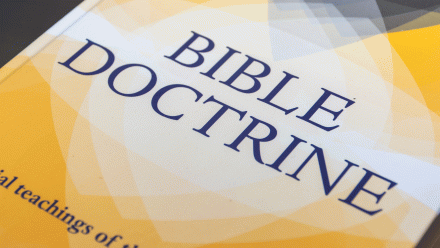The letter from the board of an affluent, mid-sized congregation in suburban Chicago contained an urgent message: increase giving or else.
While affirming the past faithful giving of members, the letter also emphasized the impact of the economic recession. Some members recently lost jobs and struggled to maintain their regular giving levels. And others who worried about their financial futures did not increase giving. The result: the church budget faced a serious and unexpected deficit, prompting the board to consider serious cuts in mission and ministry.
“We are striving to fulfill God’s call, and also to be good stewards of your financial support to this church,” the letter read. “Now, at this critical time in this ministry, we will have to make cuts in our staffing and programs. We know you do not want to see this happen. We know that you want us to meet our budget commitments. So we are asking you to give sacrificially and give more—as much as you can, right now—so that we can keep our ministry intact.”
The church’s pastor also preached a sermon on sacrificial giving. Lay leaders made their appeal at announcement times in the service. Some members gave testimonies of how the Lord gave them the resources to give more in tough times.
The appeal worked—to some extent. But cuts still occurred, and the board resolved to prepare a “bare bones budget” for the next fiscal year.
The church leaders thought that highlighting the situation as they saw it simply ‘told it like it was.’ But many believe such an approach, often used by churches during periods of economic struggle, is fundamentally flawed, looking at stewardship as a budget-driven program based in human scarcity, rather than a spiritual growth opportunity grounded in God’s abundant provision for all needs.
Leaders and stewardship consultants say the worst message that financially struggling churches can send is one of desperation, frustration, or shame. Instead, the message must emphasize opportunity.
It’s not an easy task. Many congregations across the country, and from every denomination and tradition, have faced budget shortfalls this year.
“The ‘Fat Thinking Era’ is over,” says Jim Sheppard, principal partner and chief executive at Generis, a Christian stewardship and development firm. “Now, we are in leaner times. Now we have to think and pray more deeply about the nature of the projects, and only the best will get funded because people will give the funding to those ministries with the best return on investment.”
The challenge for churches is to craft messages showing members how their giving brings those tangible and intangible returns, using a variety of communication methods.
When communicating an end-of-year shortfall, experts advise church leaders to emphasize what God can do with generous givers, rather than what members are not doing with their personal funds.
“In healthy churches, leaders never communicate that the economy is ransacking the church budget or causing massive cuts,” Sheppard says. “Instead, they stress that God is opening many opportunities for ministry, and that God continues to bless people with resources to share.”
One church in Seattle found itself behind budget targets with two weeks left in its fiscal year several years ago. Using its blog, church leaders invited members to respond positively and faithfully. “As we both look to the future and attend to the here and now,” the pastor said in his blog, “our end goal is to finish well. Our church has been entrusted with a lot of resources—’talents’—and our call is to use these gifts well and finish strong in life, in ministry, and in this month.”
What to say
At the heart of communicating a financial need is the opportunity to promote spiritual growth in stewardship. That’s an important strategy for deepening faith commitment. It’s also a theme not often explored in congregational life. Its been estimated that 85 percent of pastors have little or no theological training in Christian stewardship, and feel uncomfortable addressing the topic. But cultivating a generous spirit in the church makes sense if church leaders believe they serve a generous God.
While stewardship usually shows up as a line-item in most church budgets under “Income,” it does not promote or prompt giving—it only accounts for it. So, church leaders often reverse the order and think that people will give to meet budgets.
If that’s the case, Sheppard says the church always will struggle to make ends meet.
Brian Kluth, an author of numerous books on stewardship, agrees.
“I think that churches have done a disservice for decades by focusing on the budget,” Kluth says. “Let’s be clear in the church: it’s not what the budget says, but what the Bible says.”
The Bible has a lot to say about money—particularly about deepening our dependence on God’s provision, and also about generosity.
“Churches often are doing nothing new or adventurous because they are concerned with adhering to the budget,” Kluth says. “Why don’t we call people instead to give to God?“
Such a message, Kluth says, challenges people to grow spiritually and to trust even more in God’s provision.
“If we teach people to give to God, they will give more—and there is greater blessing all around,” Kluth says.
When the budget is not the driving force in stewardship, it becomes a solid annual planning tool.
“As people gave more in my own church, the leaders used the surplus to tackle new ministry initiatives,” says Kluth, referencing his prior role as senior pastor of a congregation in Colorado Springs, Colorado. “The excitement was palpable. In 10 years, we increased giving by 88 percent—but expenses went up just 50 percent … Budgets don’t inspire people to give, but God’s Word does.”
Church leaders can take a two-fold communications approach to prudent fiscal management and the promotion of generosity in giving. The fiscal budget acts as a solid financial planning tool, but church leaders also can develop a “dream budget” that spells out how the church’s ministry can expand and grow with greater abundance—what it believes God has called it to do were additional resources to materialize.
How to say it
Church leaders need to consider multiple methods of communication with members about financial issues and how those approaches can reinforce the positive signals they want to send.
Churches typically use five methods to reach people with news about church finances and the challenge to give. Each method has pros and cons, and ultimately, an approach depends on how members are accustomed to receiving communication in general, not just from the church.
Every-member mailing
This approach, via mail, is the most common one churches use to make a special appeal for member giving.
Pros: Every member receives the same communication at about the same time. Some members prefer to receive communication in this way, or do not have access to email. Signatures also make the letter look official.
Cons: Some people put mail in a big stack and read it at another time, especially when the salutation reads, “Dear Member.” Mail delivery also can be less than perfect.
Public announcement
This can happen in person or in a church publication. Usually, a person other than the pastor stands during announcement time to give a financial update, as well as the ministry possibilities if giving increases. Or, a committee (or the church board’s finance committee chair) writes a newsletter article or bulletin announcement with the same message.
Pros: This approach is the least expensive and, when in person, the most direct. Members often do read through the newsletter for information about activities and events.
Cons: Not everyone who needs to hear the message will be in attendance. People also can bypass information buried within a newsletter—and it often is not sent first-class, which takes time to arrive.
Targeted communication
Some churches will directly contact those who have fallen behind in giving to encourage them and make arrangements to catch up.
Pros: The contact (usually by mail) is directed at one of the chief causes of the financial problem, and costs less than reaching everyone.
Cons: These members may feel singled out, almost like being pursued by a bill collector.
Member email
Many churches collect member email addresses and communicate regularly through email, and more are turning to this as a way to relay financial information.
Pros: People look regularly to email for current information and important messages. It also is a very low-cost method.
Cons: Email addresses change, often without advance notice. People scan emails rather than read them, so they may not get the impact of your financial message. Some emails end up in a “spam” or “junk” folder.
Blogs and websites
Churches with a younger or technology-savvy congregation base are turning to this approach more.
Pros: Articles on blogs and websites can be personal and compelling, and many can share in the conversation.
Cons: These may be read primarily only by younger audiences.
Church leaders should blend methods and technologies to saturate the message, remind members of the importance of giving to meet church financial targets, and create some positive urgency.
The most effective methods for communicating depend on the news and the congregation. However, three basic rules apply to all local churches.
First, the younger and better educated the members are, the better it is to communicate electronically and immediately. Second, the more personalized and customized the communication, the more likely people will respond because church leaders are talking directly to them. And third, positive, goal-oriented language, regardless of the communication method, inspires and informs people, and gives them a sense of God’s abiding presence and abundant provision in their lives. That will help them grow in giving now, and in the years to come.



















